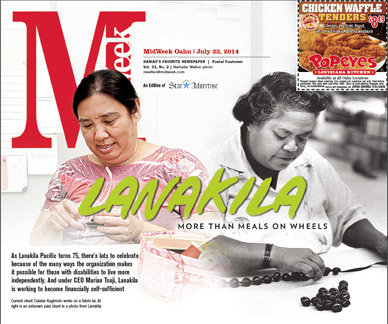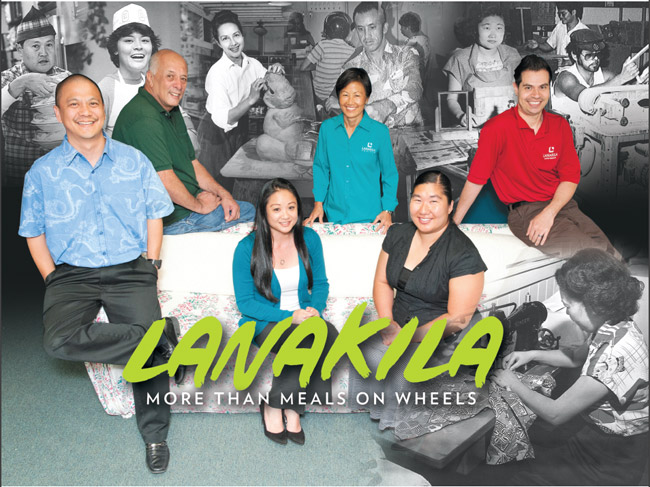Lanakila: More Than Meals On Wheels
As Lanakila Pacific turns 75, there’s lots to celebrate because of the many ways the organization makes it possible for those with disabilities to live more independently. And under CEO Marian Tsuji, Lanakila is working to become financially self-sufficient
mw-cover-072314-lanakila-nw_1
Current staff in this collage of images old and new created by James Nakamura are (from left) Paul Harada, director of food services; Ben Brown, home delivery and volunteer supervisor; Shannon Carvalho, director of maintenance and production services; Marian Tsuji, president and CEO; Lori Lutu, director of Lanakila Teaching and Learning Centers, and Adam Beyer, custom products manager. Photo by Nathalie Walker | Archive Photos Courtesy Lanakila
For many, Lanakila Pacific is immediately associated with its Meals on Wheels program, which benefits kupuna in the community.
What Violet Kam started in 1939 in order to aid those recovering from tuberculosis has grown into an organization that serves various parts of the community.
However, there are other aspects of the organization you might not know about that serve the state’s disabled residents, helping them create a more independent lifestyle.
For CEO/president Marian Tsuji, Lanakila’s overall theme is independence, and as it celebrates its 75th anniversary, the organization has high hopes for the future.
“But it really takes a lot of interdependence for us to get here,” she says.
The interdependence she speaks of comes in the form of Lanakila’s different components: Meals on Wheels, Teaching & Learning Centers, Kitchen, Maintenance Services, and Custom Products.
All components not only serve as a training opportunity for those with disabilities, but also as a way to help fund the organization’s operations.
Trainees come to Lanakila through the Hawaii Division for Vocational Rehab under the state’s Department of Human Services.
“They’re identified as having disabilities, so it’s our job to get them technical skills, as well as soft skills, so they can get competitive employment,” explains Tsuji.
Seventy-five percent of the work done by Lanakila’s social enterprises (Kitchen, Maintenance Services and Custom Products) must be performed by those with significant disabilities.
Tsuji adds that workforce training is an important aspect of all Lanakila Pacific’s social enterprises.
“That’s really what the objective is,” she says, “to create the independence so people can get competitive employment once they’re finished. So within all of the workforce we’re working at training folks so that they can be placed outside.
“We do time studies in each of the areas. They’re getting measured against a standard, and it’s not just the efficiency but also the quality of work.”
While Lanakila’s goal for its participants is independence in daily living, it also has a high goal for itself.
According to marketing manager Marlena Willette, Lanakila is working toward independence as an organization.
“Part of our vision is to achieve financial self-sufficiency as an organization, so we’re not so dependent on grants and donations,” she explains.
KITCHEN
Within Lanakila Pacific’s food service, there are three sites: Bachelot Street, Joint Base Pearl Harbor-Hickam and Kauai.
According to Paul Harada, director of food services, 16 staff and 19 trainees work out of Bachelot, four staff and three trainees out of Kauai, and Pearl Harbor-Hickam benefits from 32 staff members.
Also under the umbrella of food services and the kitchen are school lunch programs (for about 19 schools), 32 group dining sites/adult centers, and corporate caterings.
In 2012, Lanakila Pacific partnered with Nalo Farms in Waimanalo to start up its own farm on the Windward side, where one staff and two trainees are based.
“The partnership has been working out well,” says Tsuji. “Farming has its challenges, so we’re learning about all the complexities that farmers are faced with.”
Some of the produce heads to Lanakila Kitchen, and the rest is sold at wholesale to Nalo Farms.
Unique to the kitchen is the bottling service it provides.
“We bottle sauces, and one of our biggest customers, we bottle salts for her,” Harada says. “Some of the salts we mix ourselves, and that includes filling the container, capping and labeling.”
Lanakila Kitchen also provides the meals for the organization’s Meals on Wheels program, which started in 1971 to feed hot meals to seniors and those who suffered from tuberculosis.
Meals on Wheels now consists of two different components. The first is a group dining program for seniors.
“It’s a site the seniors come to where they do exercises and get some education, and then they share in a nutritious meal after the program,” says Tsuji.
The second part is home-delivery to 600-700 seniors who are not able to travel outside the home.
“That includes about 250 volunteers,” adds Tsuji. “We’re really dependent on the volunteers to have that program work.”
Lanakila Pacific is able to support the Meals on Wheels program through its social enterprises.







